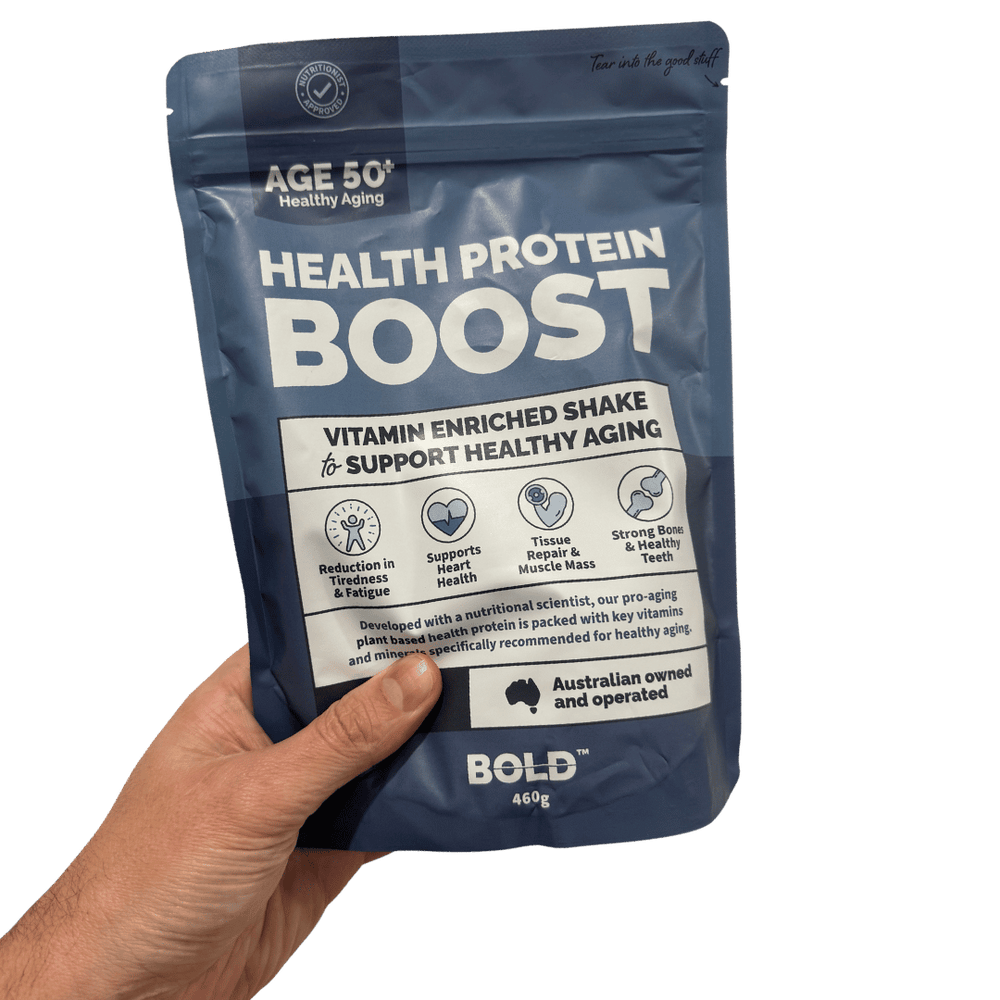What We Get Wrong About Menopause
Recently our pharmacist Alex Shepherd spoke with menopause-pharmacist Bo Youn Kim all about menopause.
Here’s a breakdown of the key takeaways from their chat, with 10 key points and great advice. Thanks for reading!
When you hear the word "menopause," what comes to mind? Hot flushes? Mood swings? An inevitable part of aging? While many women know the basics, there’s so much more to the story.
Unfortunately, a lot of what we think we know about menopause is either incomplete or just plain wrong.
Let’s talk about what’s really going on:
-
what treatments are available,
-
and how you can support your body with the right nutrition, including protein intake.
1. Menopause Isn’t Just Hot Flushes and Night Sweats
Sure, hot flushes are common — but menopause is about more than just feeling warm. In fact, there are over 75 symptoms that can be linked to menopause. These include brain fog, joint pain, fatigue, mood swings, palpitations, dry skin, and even changes in how we store fat (hello, stubborn belly weight!).
The changes begin with perimenopause, which can start up to 10 years before your final period. That means symptoms might show up in your early 40s, or even late 30s — well before most women expect them.
2. You Don’t Need a Blood Test to Know You’re in Perimenopause
Many women may be asked to get hormone tests before starting treatment. But here’s the truth: if you're in your early to mid-40s and experiencing common symptoms, blood tests may not be necessary. Menopause and perimenopause can be diagnosed based on what you're experiencing — not just what shows up in a lab. Hormone levels fluctuate so much day-to-day that test results can often be misleading.
If you’re under 45, testing may still be useful, but it’s crucial to time it with your menstrual cycle for accurate results — ideally on day 2 or 3 of your period.
3. You’re Not "Too Young" to Be in Menopause
One common myth is that you don’t start experiencing menopause symptoms until your 50s. Many women are told they’re "too young" when they seek help — only to be offered antidepressants instead of actual hormone treatment. But many women can begin experiencing symptoms in their early 40s.
That misunderstanding can delay proper care and leave women feeling invalidated and alone.
4. Heavy Periods Could Be a Menopause Signal
Many assume menopause is all about periods stopping. But in perimenopause, periods often become heavier first. This can sometimes lead to unnecessary surgeries like ablations or hysterectomies. In reality, these issues may be better addressed with hormonal support — not the operating room.
5. HRT Is Not the Enemy
Hormone Replacement Therapy (HRT), now often called Menopausal Hormone Therapy (MHT), has a bad reputation thanks to outdated studies. These days, the types of oestrogen available are much safer and more effective — especially transdermal oestrogen and body-identical options like micronised progesterone.
“Body-identical" means these hormones match those naturally made by your ovaries, so your body can use them more easily.
When started within 10 years of menopause, HRT’s benefits may significantly outweigh the risks, offering potential advantages such as:
-
Reducing hot flushes and night sweats
-
Improving mood and mental clarity
-
Protecting against osteoporosis
-
Lowering the risk of heart disease
-
Improving libido and vaginal health
6. Libido and Intimacy Matter Too
Many women feel awkward talking about low sex drive. But libido is part of your quality of life — and it’s influenced by hormones like testosterone. If you’ve lost interest in intimacy, don’t suffer in silence. Ask your doctor if testosterone therapy might be right for you.
You may need to see a menopause specialist, as not all GPs are confident prescribing it yet.
7. You Can Customise HRT
There’s no one-size-fits-all with hormone therapy. Some women use a patch. Others prefer a gel or pill. Some may combine hormone options with devices like the Mirena IUD to manage both contraception and symptoms.
Working with a knowledgeable provider can help you fine-tune your treatment over time to suit your body’s needs.
8. Nutrition Changes Matter More Than Ever
As hormone levels shift, your muscle mass and metabolism can take a hit. That’s where nutrition — especially protein intake — becomes crucial.
Why is protein so important?
-
Helps maintain muscle mass
-
Supports bone health
-
Aids in hormone production
-
Keeps you feeling full and energised
Aim for 25–30 grams of protein per meal, focusing on sources like lean meats, dairy, legumes, tofu, and protein supplements if needed.
Also, don’t forget:
-
Calcium and Vitamin D for bone strength
-
Healthy fats (like omega-3s) for brain function
-
Prebiotics and fibre to support digestion and cholesterol control
9. Mental Health Isn’t Always Just “Depression”
Many women are diagnosed with depression or anxiety in midlife. But sometimes, these mental health changes are directly linked to hormone fluctuations. That doesn’t mean you necessarily need an antidepressant. Often, HRT can help address the root cause — especially if mood changes are new and not linked to previous mental health issues.
Talk to your healthcare provider about all your symptoms, even the ones you think might not “count.”
10. You Don’t Have to "Just Get Through It"
Menopause isn’t something you just have to suffer through. Whether you're struggling with hot flushes, brain fog, low energy, or changes in weight and mood, there are treatments available — and they can be life-changing.
You deserve to feel like yourself again. You deserve answers. And you deserve care that listens to your body — and your story.
Take Action
If you're navigating menopause and want to feel better — not just “get through it” — start by:
-
Tracking your symptoms
-
Reviewing your nutrition, especially protein intake
-
Speaking with a provider who understands modern menopause care
-
Advocating for your health — you know your body best
If you'd like to listen to the full episode on Spotify Click here >
Here's a handy tool for tracking symptoms - the AMS Symptom Score Survey to assess where you’re at with your symptoms: AMS Symptom Score Card
It’s a simple tool you can complete yourself.
Let’s stop the silence and rewrite the menopause story — together.
Bo Youn Kim is a senior clinical pharmacist in Western Australia with a special interest in women’s health, especially menopause. She has worked in various health settings and is currently based at Royal Perth Hospital.
Her personal experience with perimenopause inspired her to focus on educating and empowering women through midlife health challenges.

She founded EmpowHer Menopause to provide consultations and community education. Bo promotes an evidence-based approach to menopause care, aiming to dispel myths and clarify treatment options.



